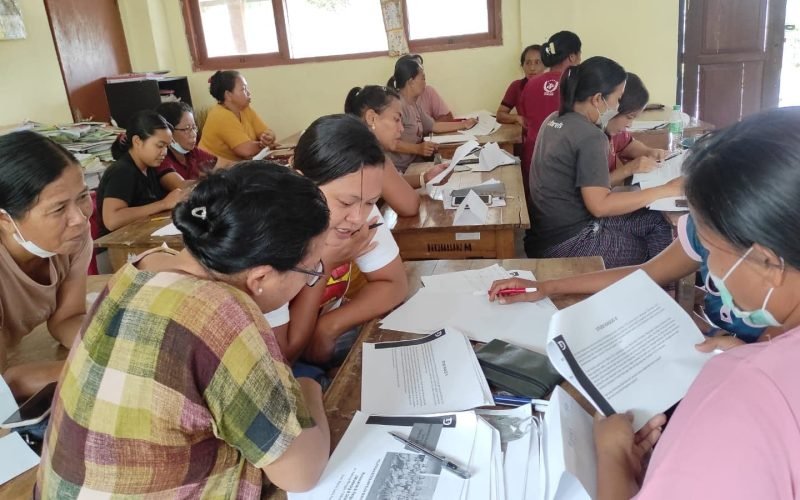Manggis Update Part IV, 2022: Preparing for Tourism
Indonesia, March 3, 2022- There have been some exciting developments for tourism in Bali recently with the announcement of their first international flights touching down, as well as quarantine time lessening to 3 days for vaccinated travellers.
There are plenty of rumours that restrictions will be lifted even further in the coming weeks, prompting a wave of anticipation that things are finally looking up for the island.
As the island begins to prepare for the return of tourism, we have been working closely with the community groups in Manggis village to position them as an enticing destination for travellers to enjoy fantastic experiences.
You can read the whole story of our partnership Manggis in parts I, II, and III of our journey.
Many of the people who live in Manggis village once worked in the tourism sector. Many of the villagers are recent returnees from more established tourism destinations in South Bali – they returned home after the loss of many jobs during the pandemic.
A central goal for Discova has been to prepare this community to transition back into that sector. Many of the skills of those returning villagers can be replicated and built upon throughout the community, ensuring the entire community benefits from the return of tourists.
Readying the community for tourism
To achieve the goal of integrating the community and their organic farming methods with tourism, our programmes have been focusing on building new and existing community groups to hold workshops for training on both theoretical and practical skills development.
These workshops focus on providing an opportunity for learning and coaching so that the community can independently implement Discova programmes in a sustainable way.
These programmes are run by the community, within the community, and for the community. Discova is here to simply guide the process as mentors. This means that the implementation of tourism programmes preserves the authentic local wisdom within the Balinese community, celebrating their identity through art, culture, customs, and agriculture. The homegrown, locals-led aspect of these programmes ensures this authenticity.
Manggis is in an area of outstanding natural beauty.
Here are some of the ways this is being done:
A special governing group was formed for the development of Manggis village tourism. This will be responsible for the management of Discova tourism programmes.
Training has been delivered on Discova programmes so that the group can understand the development objectives and can synergise with existing farmer groups.
We’re planning to deliver tour guide training to some villagers. At Discova, we are proud of the standard of our guides – it is vital that those leading treks around Manggis can maintain these high standards and understand what is expected.
We’re about to provide English courses for villagers.
We have planned cooking class workshops, including advice and guidance on customer service – how to welcome guests, serve drinks and food etc.
We’re going to hold Balinese massage workshops for the women. These are skills they may already know but is about instilling the business acumen to make this a product.
We have continued to cooperate and make decisions regarding the management of funds – using our expertise to intelligently advise investment in infrastructure that will benefit the community.
In addition to readying the community for tourism, we’ve been continuing our work with Sri Sedana (the organic farming group) and Bakung Asri (the women’s farming group) to maintain the cultivation of rice, vegetables, oil, and fertiliser. These endeavours ensure the community is sustaining streams of income independently.
The resident goats of Manggis.
Organic farming group “Sri Sedana”
Since we first helped the village by fixing the canal irrigation system, we have gone on a transformative journey with the village’s farmers. After converting the farmers to organic rice production and already through one successful harvest, the group has been put into action to achieve the following:
The production of organic fertilizer that can be used by group members as well as being sold to outside groups.
Goats being bred as one of the natural producers of manure for compost material.
Regular study groups for strengthening the composition of compost, as well as workshopping its packaging and marketing.
Cultivation of refugia plants. These are natural deterrents that can be planted in the rice fields to prevent pests from attacking the crops.
Discova training programmes.
The women’s farming group “Bakung Asri”
Since the beginning of our partnership in April 2021, KWT Bakung Asri has been able to source additional funding from the government as well as from workshops run by Discova, resulting in the renting of additional land. They have built seed houses for horticultural planting such as vegetables, herbs, and spices. The group and villagers have cooperated on numerous initiatives, including:
Making liquid organic fertilizer on a regular basis which can be used on group land and sold at surrounding markets.
Holding workshops on the manufacturing process for traditional Balinese coconut oil.
Holding a marketing strategy workshop so the group has the knowledge and skills needed to sell their products.
Receiving certification of the coconut oil-making machine.
The next phase of development
We’re extremely excited at the prospect of the Manggis village becoming a popular attraction for tourists, not only because the community offers so much opportunity for experiences and an insight into authentic Balinese culture, but because the local people could return to a sector that they once worked in prior to the pandemic.
This has been our focus since we began working with the local community, and we’re thrilled to see travel restrictions ease in Indonesia to facilitate the return of international travellers.
Of course, we will continue to share all the goings-on at Manggis with our partners.
However, if you have any further questions about the project, what’s going on there, and how you can get involved in any way, don’t hesitate to reach out to our teams.
The article is reposted with permission from Discova, a valued PATA International Member that specialises in luxury tourism representation and provides sales, marketing, promotion & public relation services in the Asia-Pacific region. PATA proudly supports discussions around sustainability through the SDGs Matters guest post initiative. Please note that the views and opinions expressed in the videos may not necessarily reflect the official policy, position or views of PATA or any of its employees.






